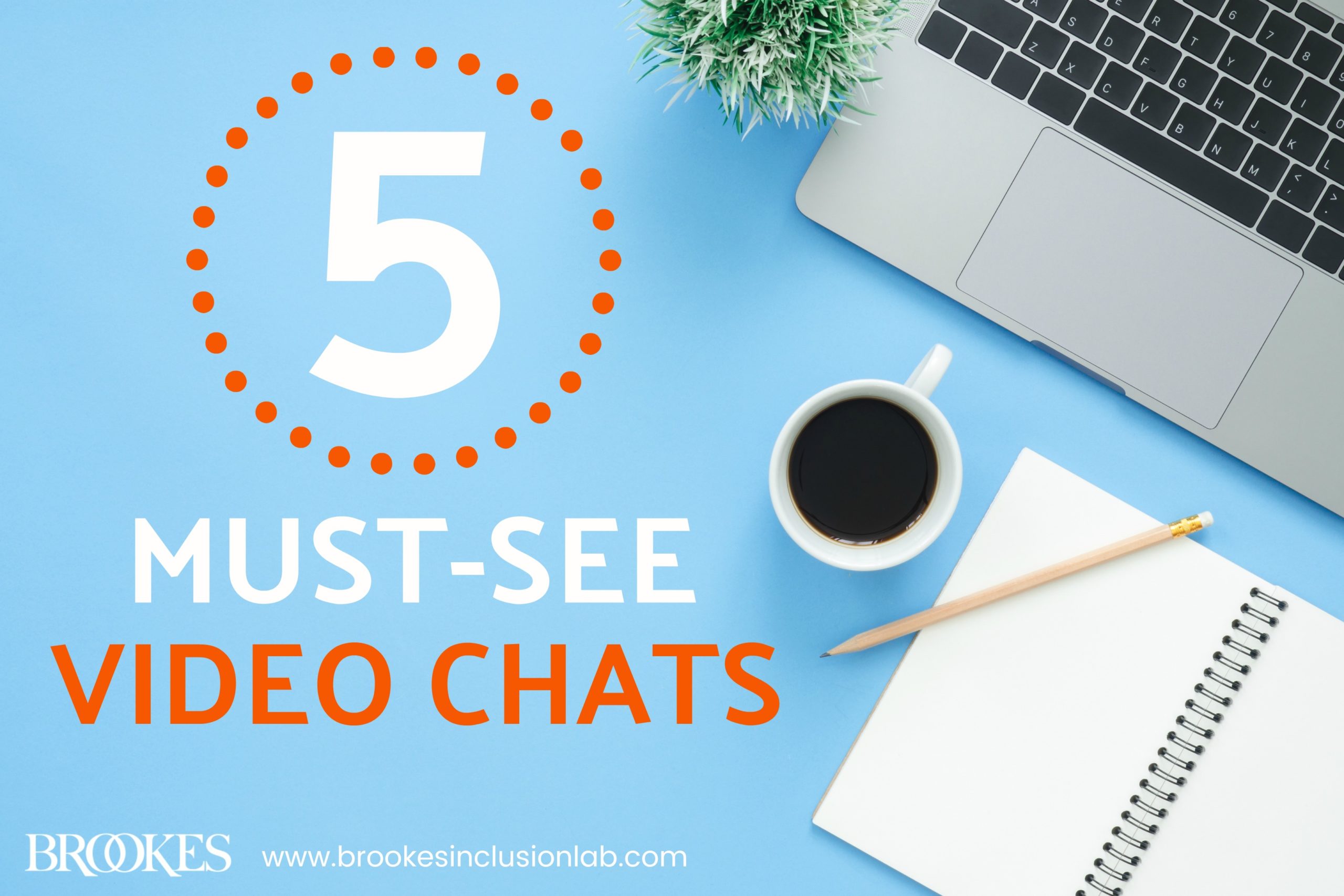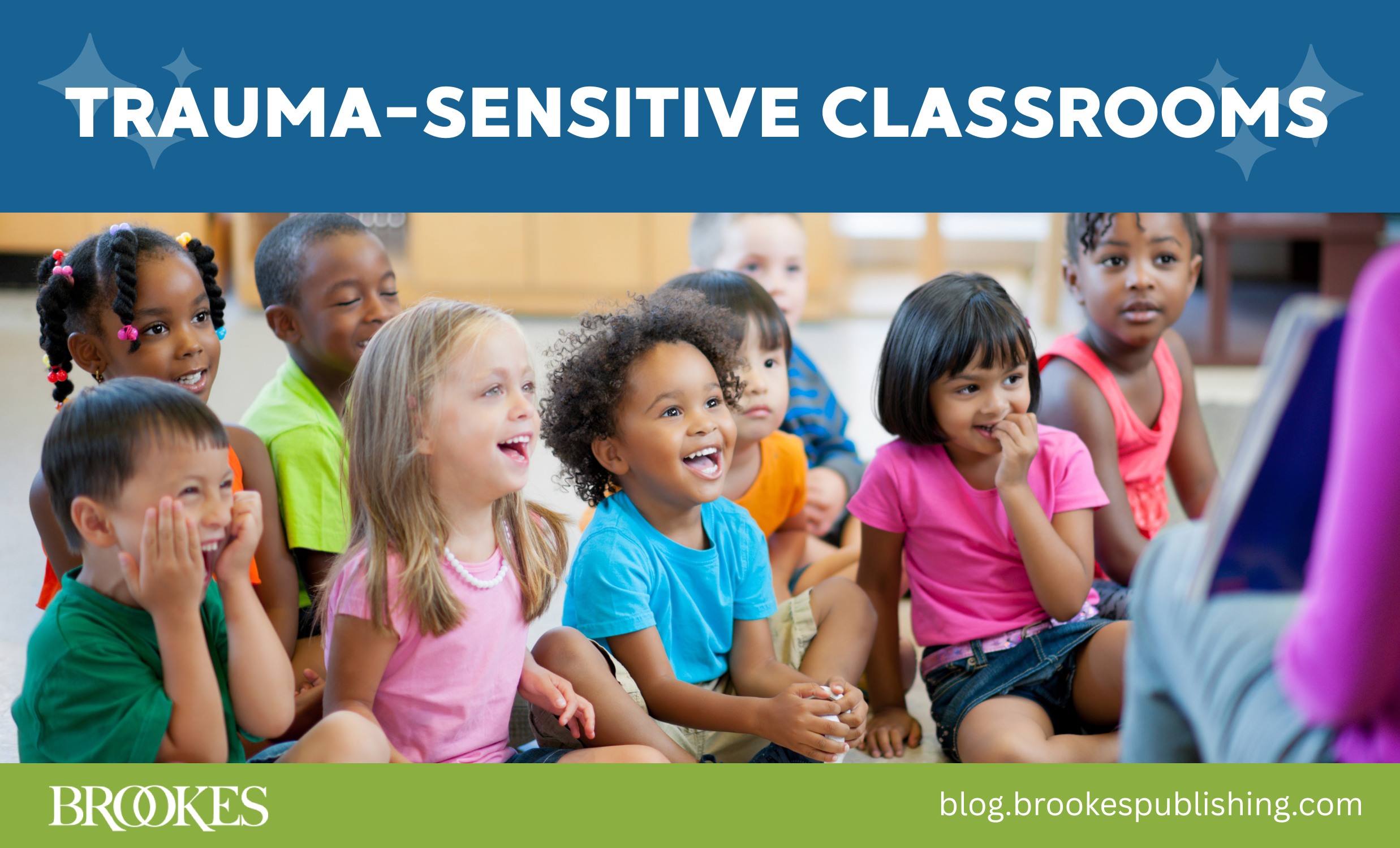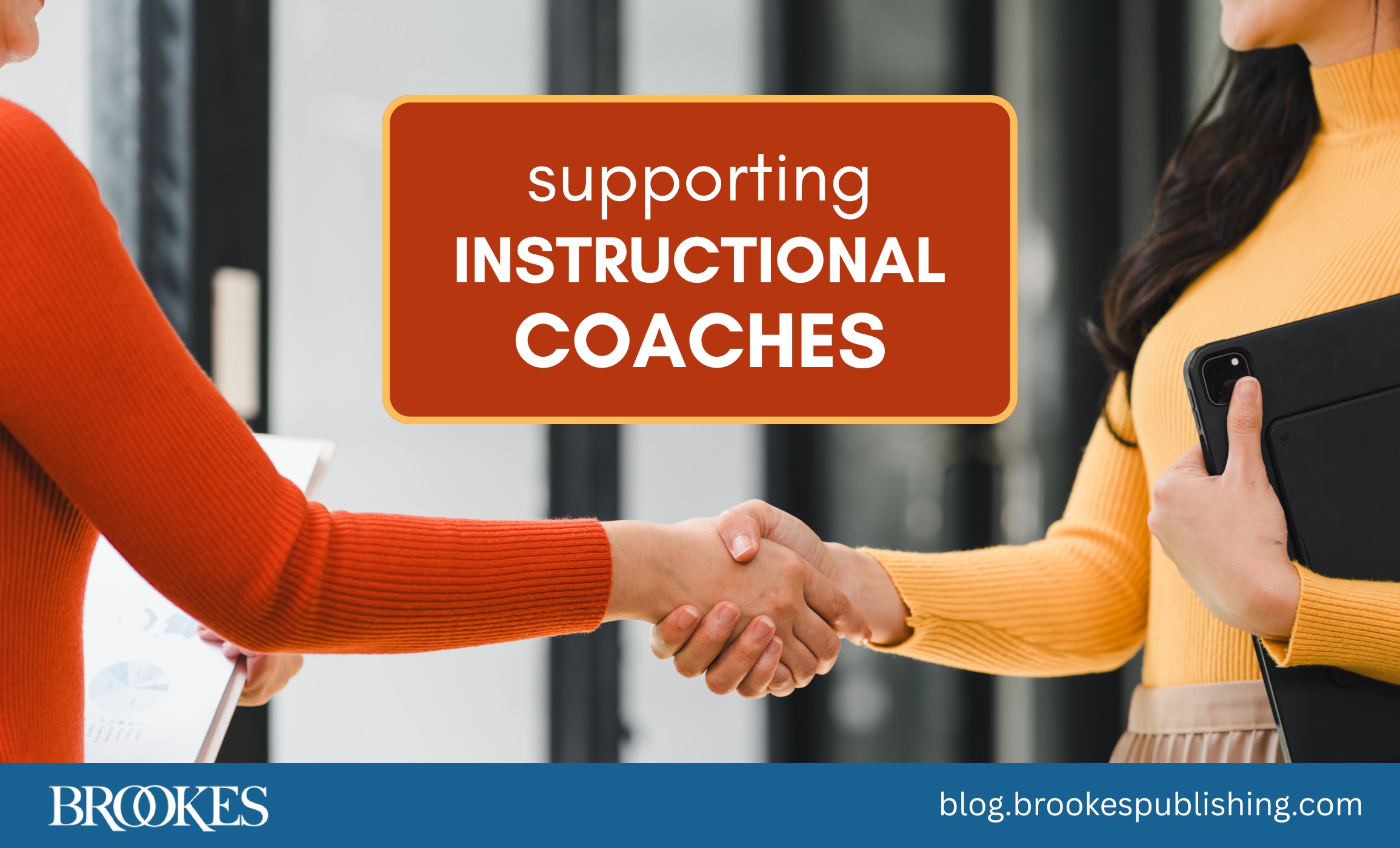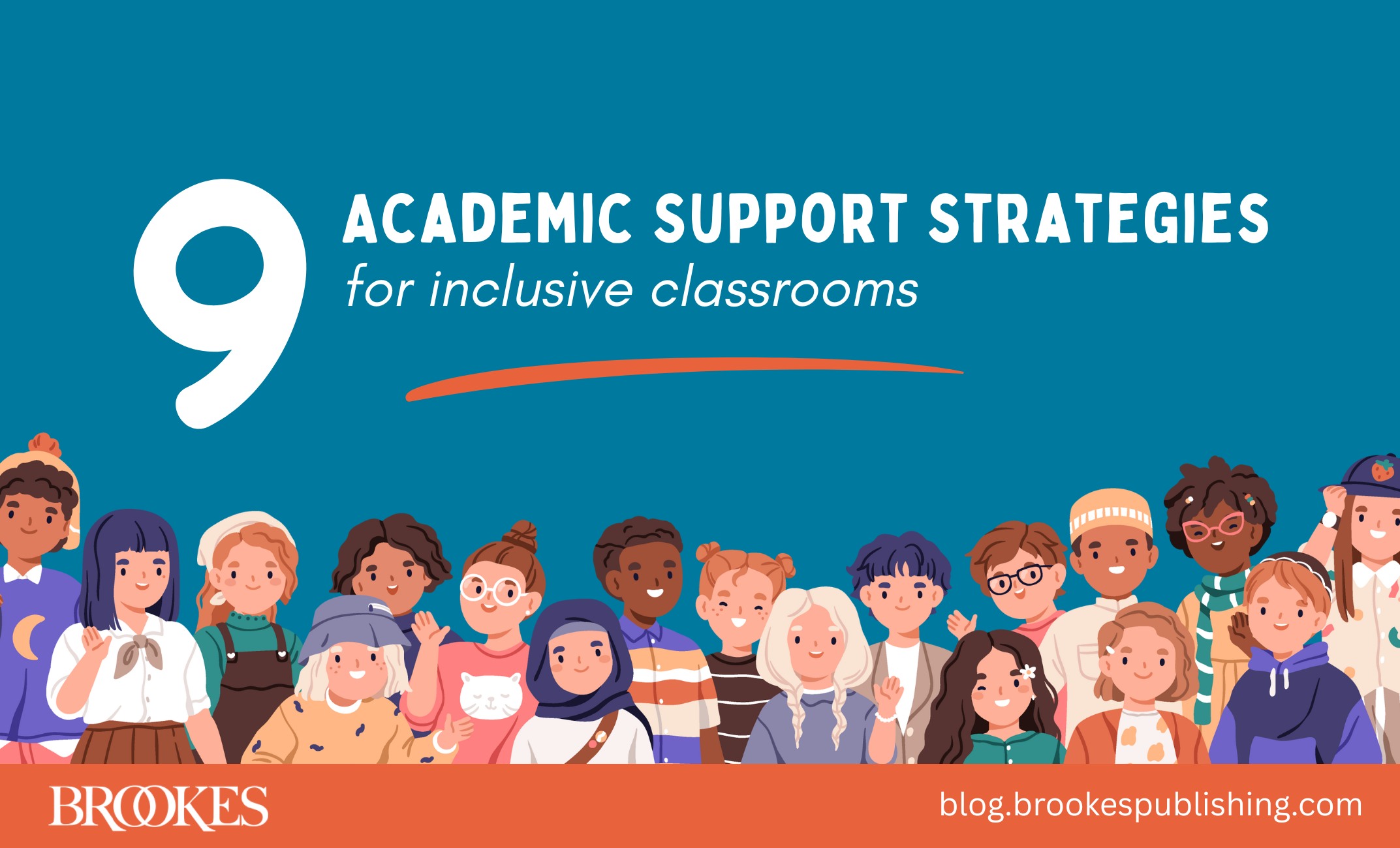5 Must-See Video Chats for Teacher Professional Development
May 19, 2020
If you follow Brookes Publishing on social media, you’ve probably been hearing about our series of free, informal coffee chats with our expert authors. These professional development presentations take about 30 minutes—perfectly sized for your busy schedule!—and are packed with practical tips and guidance on key topics, many of them uniquely relevant to the ways you’re teaching now.
In today’s post, we’re highlighting five recent coffee chats (with links to recordings) that every teacher should see as we wind down this school year and look ahead to the next. To see the full list of upcoming chats and watch the archived presentations, visit our main coffee chat page.
Making Curriculum Modifications in Minutes, presented by Nicole Eredics
 Full inclusion depends on students not only being included at the school and classroom levels, but also at the curriculum level. Enhance your inclusion toolbox with some quick-and-easy curriculum modification ideas for elementary and middle school classrooms, in this invaluable video chat presented by Nicole Eredics, author of Inclusion in Action.
Full inclusion depends on students not only being included at the school and classroom levels, but also at the curriculum level. Enhance your inclusion toolbox with some quick-and-easy curriculum modification ideas for elementary and middle school classrooms, in this invaluable video chat presented by Nicole Eredics, author of Inclusion in Action.
Nicole shares simple, specific instructional strategies for:
- Altering the conceptual difficulty, educational goals, and instructional methods of a lesson so students of all abilities are included
- Breaking down math, reading, and science content so it’s more accessible and achievable for all learners
- Teaching students with intellectual disabilities material that is related to the curriculum, but in ways that are suited to their educational needs and IEP goals
At the end of the presentation, you’ll also receive a list of helpful resources, including an online binder full of classroom-tested modified lessons submitted by educators like you.
Executive Skills and ADHD, presented by Erik Von Hahn
 Executive function skills—which include the ability to sustain attention, follow directions, think flexibly, self-regulate, and more—are among the most accurate predictors of future success, but students with ADHD often struggle with one or more of these cognitive processes. Presenter Erik von Hahn, co-author of Essential Skills for Struggling Learners, quickly sketches the relationship between executive skills and ADHD, and then highlights a few simple strategies for supporting two of the most critical skills for students with attention issues: impulse control and working memory.
Executive function skills—which include the ability to sustain attention, follow directions, think flexibly, self-regulate, and more—are among the most accurate predictors of future success, but students with ADHD often struggle with one or more of these cognitive processes. Presenter Erik von Hahn, co-author of Essential Skills for Struggling Learners, quickly sketches the relationship between executive skills and ADHD, and then highlights a few simple strategies for supporting two of the most critical skills for students with attention issues: impulse control and working memory.
Get ready-to-use tips for:
- Building rapport with students and helping them feel like valued members of the classroom
- Assisting students with identifying patterns of impulsivity and forgetfulness
- Developing reminder systems like working memory lists and non-verbal cues so students can gain insight into their difficulties, learn what strategies work for them, and eventually self-correct their behavior
Watch now for some useful insights into helping students with ADHD become more mindful, self-directed, and successful learners.
Self-Care in the Era of COVID-19, presented by Dyane Carrere
 Our daily lives have experienced a major upheaval, with new demands placing an increased strain on our emotional resources. Walk away with practical strategies for building up emotional capital and avoiding stress overload in this can’t-miss video chat presented by Dyane Carrere, author of The Re-Set Process (a new book on trauma-informed behavior practices, coming in fall 2020). Carrere’s suggestions are focused on calming the neurological system and highlight the importance of:
Our daily lives have experienced a major upheaval, with new demands placing an increased strain on our emotional resources. Walk away with practical strategies for building up emotional capital and avoiding stress overload in this can’t-miss video chat presented by Dyane Carrere, author of The Re-Set Process (a new book on trauma-informed behavior practices, coming in fall 2020). Carrere’s suggestions are focused on calming the neurological system and highlight the importance of:
- Predictability. You’ll learn why schedules should be predictable enough to make our brains happy, but also flexible enough to be responsive to your current emotional state. Also discussed are finding ways to populate your day with small, comforting moments of ritual.
- Pause & Reset. Carrere outlines her two- to three-minute Pause and Reset process, a series of brief, spirit-renewing exercises that include gross motor movement, focused breathing, and brain-restoring mindfulness tasks.
You’ll also discover the roles that connectedness with others and consistent sleep play in fostering a sense of emotional wellbeing. Your journey toward better self-care starts here.
Virtual Student Engagement, presented by Tim Knoster & Danielle Empson
 Remote instruction via video conferencing technology has quickly gone from a specialty teaching tool to how the overwhelming majority of the nation’s students are currently learning. See how to boost student engagement on virtual learning platforms in this highly relevant presentation by Tim Knoster (co-author of The Teacher’s Pocket Guide for Positive Behavior Support) and Danielle Empson, from the McDowell Institute at Bloomsburg University.
Remote instruction via video conferencing technology has quickly gone from a specialty teaching tool to how the overwhelming majority of the nation’s students are currently learning. See how to boost student engagement on virtual learning platforms in this highly relevant presentation by Tim Knoster (co-author of The Teacher’s Pocket Guide for Positive Behavior Support) and Danielle Empson, from the McDowell Institute at Bloomsburg University.
Topics covered include:
- Establishing (and periodically reinforcing) performance expectations with screen-sharing features
- Tracking engagement through student comments, questions, and discussion threads
- Using advance organizers and polling software to maximize students’ opportunities to respond
- Dealing with disruptive behavior without muting or removing students from the virtual classroom
- Thoughtfully acknowledging student efforts using private chat functions, emojis, and more
Virtual instruction may be a significant part of how K-12 educators teach in the near future, so watch now and pocket some handy tips for helping students fully engage in the online classroom.
Trauma-Sensitive Student Support During School Closures, presented by Jen Alexander
 How can educators continue to support students emotionally without the face-to-face opportunities embedded throughout a typical school day? Get practical answers from trauma expert Jen Alexander in this engaging presentation. An experienced teacher, trainer, and author of Building Trauma-Sensitive Schools, “Ms. Jen” offers her best tips for supporting students who are struggling with the stress of prolonged isolation from their peers and the much-needed structure of in-person school.
How can educators continue to support students emotionally without the face-to-face opportunities embedded throughout a typical school day? Get practical answers from trauma expert Jen Alexander in this engaging presentation. An experienced teacher, trainer, and author of Building Trauma-Sensitive Schools, “Ms. Jen” offers her best tips for supporting students who are struggling with the stress of prolonged isolation from their peers and the much-needed structure of in-person school.
You’ll receive a crash course on the basics of her trauma-sensitive approach, which builds on the assumption that all kids need to:
- Feel safe: What do kids feel? What do they need?
- Be connected: How can students maintain vital social connections during social distancing?
- Get regulated: How can parents help kids make sense of their emotional reactions, and what activities promote healthy regulation?
- Learn: What do students want to learn about (beyond academic subjects) and how can caregivers help broaden that knowledge base?
See what Ms. Jen has to say on all these topics and more, and get links to some helpful free activities from her website.
If you like the five chats highlighted in today’s post, don’t forget to bookmark our page of upcoming Coffee Chats and explore the archived presentations in the “Watch On Demand” tab. We’ll be scheduling more presentations on topics that matter—if you’d like to submit your own idea for a coffee chat, please add it in the comments below!
WATCH MORE CHATS
How Mediation Restores the Respect
Presented by Ondine Gross, author of Restore the Respect
Watch the recording »
Common Types of Reading Difficulties
Presented by Louise Spear-Swerling, author of The Power of RTI and Reading Profiles
Watch the recording »
Supporting Children’s Language and Preventing Challenging Behaviors at Home
Presented by Erin Barton (author of The Preschool Inclusion Toolbox) & Justin Lane
Watch the recording »
STEM Experiences for All Children at Home
Presented by Angi Stone-MacDonald, author of Engaging Young Engineers
Watch the recording»
Supporting the Grieving Student During the Pandemic
Presented by David Schonfeld & Marcia Quackenbush, authors of The Grieving Student
Watch the recording »




Write a Comment
Your email address will not be published. Required fields are marked *
Post a Comment